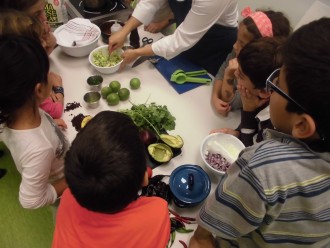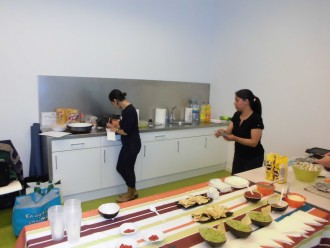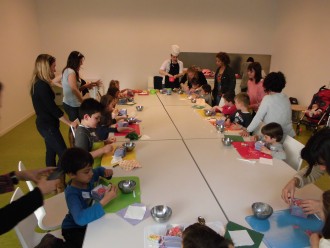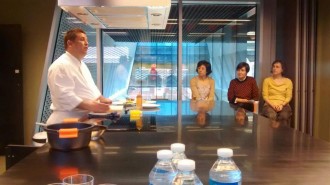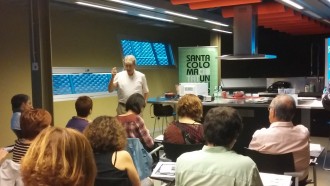Kitchens in Libraries
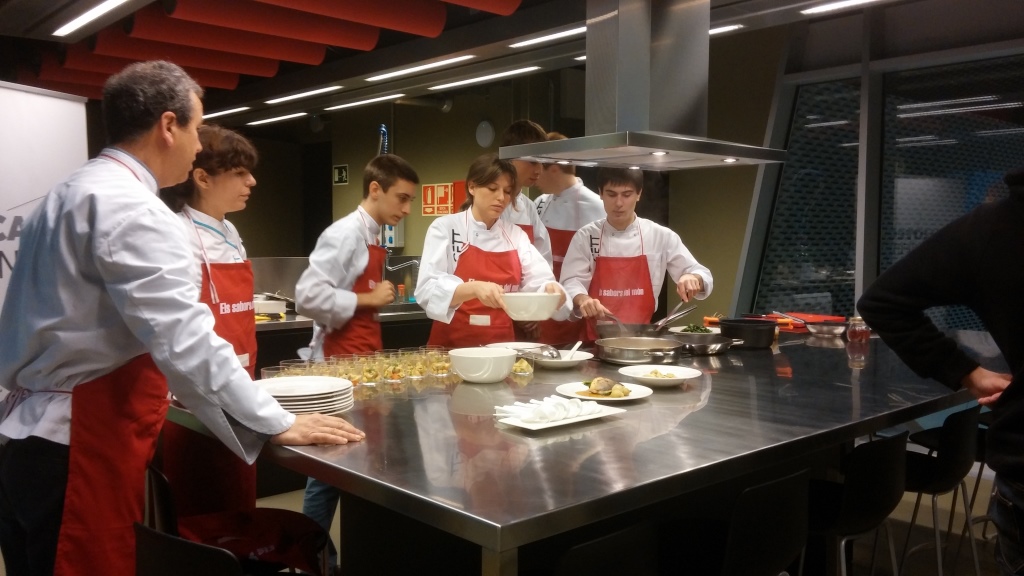
The Biblioteca del Fondo opened in September 2014 at the heart of a highly populated and multicultural neighborhood of the Catalan town of Santa Coloma de Gramenet (North-East of Barcelona). At the opposite side of Barcelona (South-West) the award-winning Central Library of Castelldefels opened in April 2012. Both libraries, in brand new buildings, are located in a geographic area where investments in libraries are outstanding.
Attending the seminar New Uses of Public Libraries (organized by the Province of Barcelona with the Library Consortium of Barcelona, the IFLA Section on Public Libraries and the IFLA Section on Library Buildings and Equipment), I learned that these two libraries had kitchen and cooking programs. I emailed both library directors a few questions. [1]
Children’s Mexican Cooking Workshop at the Central Library of Castelldefels
Public Libraries Online: What made your library decide to start activities about cooking?
Mariona Chavarria Domingo (Biblioteca del Fondo): Seeing the multicultural context of the neighborhood, the municipality, [and] aiming for social cohesion, [we] thought about the idea of “cooking” as a central point to all cultures, and as an excuse to bring diversity together and build a community by creating mutual trust.
Marta Granel Dalmau (Central Library of Castelldefels): Our library specializes in cooking, [so] these activities are the ideal complement for our specialty. We complete our cooking programs with a collection of books about cooking, for kids and adults.
Children’s Mexican Cooking Workshop at the Central Library of Castelldefels
PL Online: What information, tools, and processes did you need?
Mariona: One of the halls of the library has a complete kitchen installed, prepared to cook and to perform cooking shows. It is equipped with a hotplate, electrical oven, microwave oven, fridge, [and] dishwasher. It is also equipped with enough kitchenware (a list of which was provided by a local Restoration School). We have gathered information about legal points to take into account (related to health and food security, hygiene, and first aid). A Commission has been established in order to think about the project named “Cuines del Món” (Cuisines of the World), which includes the kitchen and a section of the library collection (books and other document types).
Marta: We need professionals to do the activities, normally local collaborators, [as well as] multipurpose spaces and users interested in activities about cooking.
Children’s Mexican Cooking Workshop at the Central Library of Castelldefels
PL Online: How did you determine what activities to organize?
Mariona: The above mentioned Commission “Cuines del Món” (which includes: representatives of the municipality – politicians and technicians; representatives of social, educational, and cultural entities of the neighborhood; representatives of the University of Barcelona Campus de l’Alimentació – Food and Nutrition and representatives of Fondo trading association as well as a well-known Chef, Víctor Quintillà, whose restaurant La Lluerna has been awarded with one Michelin Star during the last three years). The overall objective of the “Cuines del Món” Project is to be a tool helping to bring together diversity; bringing down walls of lack of trust; and, being a public library, to promote reading habits and skills. We have oriented the activities in three main directions or levels:
a) Academic level – about food, nutrition, science and cooking – inviting cooks as well as university lecturers;
b) Informative level – bringing together people from different backgrounds to share a cooking session while explaining similarities and differences of cooking, for instance about rice, potatoes, or about the use of species or different kinds of oil, etc.; teaching to cook nutritive meals to people with low incomes; teaching children cooking habits, etc.
c) Reading Promotion: the library, in collaboration with educational and cultural entities of the neighborhood, organizes activities connected to its own activities (storytelling for children and families, a reading club for adults, people learning Catalan or Spanish, etc.).
In some cases we offer the kitchen space for activities organised by others: i.e., by a psychiatric center nearby, or by other similar associations; by groups working with children with social risks, etc.
Marta: First we contact the collaborators and look for the activities, we want the activities to be attractive, easy, and possible to be done in the library, without fire. Normally we try to organize the activities in cycles, for kids and for adults.
Cooking Workshop at the Biblioteca del Fondo
PL Online: What challenges did you face?
Mariona: The main challenge is to implement good projects that keep the kitchen lively and used at its best. Linked to that, another challenge is trying to keep with a regular activity in the kitchen while not having enough library staff for that, having to work with volunteers (good on one side, but unstable on the other). Also the follow-up after the activities in the kitchen (the washing up and putting back stuff in the cupboards) is an unsolved problem. I wouldn’t call it a challenge but it’s challenging.
Marta: The challenge is making programs varied, attractive, and cheap.
PL Online: What kind of positive results have you had? (And, any negative ones?)
Mariona: We are “young,” yet the fact that this library, situated in such a popular neighborhood, has a kitchen, has put this place in the newspapers for something good and unseen before. It gives a new/better status to the surrounding area. The kitchen opens us easily to different collaborations (for instance with market stall holders or other commerce in the area, or the University Campus, lecturers, and students).
Marta: The results are very positive, the users are very happy and thankful about these activities. The are usually no vacancies in these type of activities.
Cooking Workshop at the Biblioteca del Fondo
PL Online: About how much time does it take?
Mariona: It takes a lot of time: meetings, contacts, preparation of the space, being close during the activities in case of any need, and collecting and washing the kitchenware.
Marta: We spend a lot of time to program these activities. First we look for the possible collaborators who could do the activities, and sometimes we have to pay for the activities. Then we have to do advertising and registration. Afterwards we send the participants an assessment questionnaire, as we want to know their feedback.
PL Online: What advice would you give a library wanting to do something similar?
Mariona: I feel it is too soon to be able to give any good advice. The only one I can think of is: don’t be afraid to start a similar project!
Marta: At the end of the activities the users are so thankful and happy!!
Sources:
[1] Mariona Chavarria Domingo’s e-mail to author (03/19/2015); Marta Granel Dalmau’s e-mail to author (03/25/2015). The interview questions were inspired by Kate Theimer, Web 2.0 Tools and Strategies for Archives and Local History Collections, Facet publishing 2010
Tags: adult programming, children's programming, community engagement, community partnerships, cooking classes, kitchens in libraries, library outreach, library programming, library programs, partnerships

